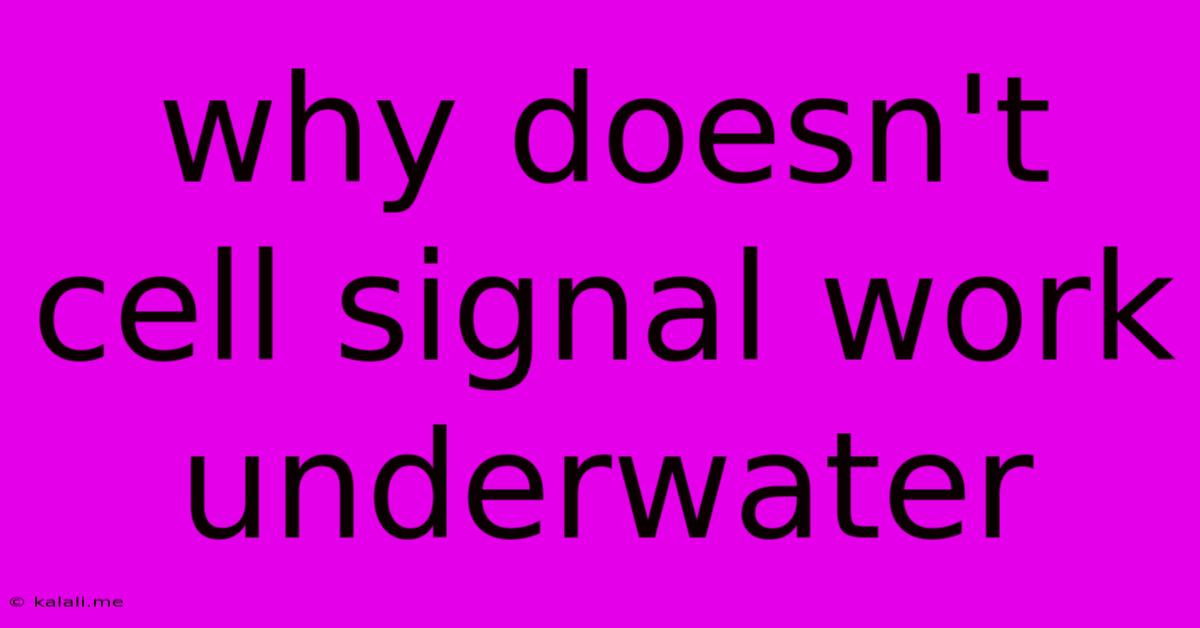Why Doesn't Cell Signal Work Underwater
Kalali
Jun 03, 2025 · 3 min read

Table of Contents
Why Doesn't Cell Signal Work Underwater? A Deep Dive into Radio Waves and H2O
Meta Description: Ever wondered why your phone loses signal underwater? This article explains the science behind why cell service doesn't work underwater, exploring the properties of radio waves and water.
Have you ever tried to make a call while swimming, only to find your phone completely dead in the water (pun intended)? The reason your cell signal disappears underwater isn't just because your phone is wet; it's due to the fundamental properties of radio waves and how they interact with water. This article will delve into the science behind this common phenomenon.
The Nature of Radio Waves
Cellular networks rely on radio waves, a type of electromagnetic radiation, to transmit data. These waves travel at the speed of light and can travel long distances, bouncing off objects like buildings and terrain. However, their behavior changes drastically when encountering different materials, including water.
Water's Impact on Radio Waves
Water molecules are highly effective at absorbing radio waves. This absorption is dependent on the frequency of the radio wave. The frequencies used by cellular networks (primarily in the gigahertz range) are significantly absorbed by water. This means that the signal weakens exponentially as it travels through water.
Think of it like this: imagine shining a flashlight through a thick fog. The light is scattered and absorbed, resulting in significantly reduced visibility. Similarly, radio waves are scattered and absorbed by the water molecules, greatly reducing the signal strength.
Other Factors Affecting Underwater Cell Signal
Beyond simple absorption, several other factors contribute to the lack of underwater cell service:
- Frequency: Higher frequencies, while offering greater bandwidth, are more susceptible to absorption by water.
- Water Salinity: Saltwater absorbs radio waves even more effectively than freshwater. This is why communication in the ocean depths is extremely challenging.
- Water Depth: The deeper the water, the greater the absorption and the weaker the signal.
- Wave Interference: The presence of other underwater objects can further interfere with radio wave propagation.
Alternatives for Underwater Communication
Given the challenges of using cellular networks underwater, alternative communication methods are necessary for divers and underwater operations:
- Satellite Phones: These phones utilize satellites to communicate, bypassing the need for terrestrial cell towers. However, these are often expensive and require a clear view of the sky.
- Submarine Cables: For fixed locations, underwater cables offer reliable high-bandwidth communication.
- Acoustic Communication: Sound waves are far more effective for underwater communication than radio waves. This is the basis for sonar and other underwater acoustic technologies.
Conclusion: Staying Connected Below the Surface
The inability of cell signals to penetrate water effectively isn't a technological limitation waiting to be solved. It's a fundamental consequence of the physics governing the interaction between radio waves and water molecules. While improving underwater communication is an active area of research, solutions often rely on alternative communication technologies altogether, rather than attempting to overcome the inherent limitations of radio waves in this environment. Understanding these limitations helps us appreciate the innovative communication methods developed for underwater exploration and communication.
Latest Posts
Latest Posts
-
How Do I Get Rid Of Tea Stains In Cups
Jun 05, 2025
-
Teenage Mutant Ninja Turtles In A Half Shell
Jun 05, 2025
-
Parents Punish Me But Wont Punish Brother
Jun 05, 2025
-
How To Plant An Oak Acorn
Jun 05, 2025
-
How To Exit Crontab With Saving
Jun 05, 2025
Related Post
Thank you for visiting our website which covers about Why Doesn't Cell Signal Work Underwater . We hope the information provided has been useful to you. Feel free to contact us if you have any questions or need further assistance. See you next time and don't miss to bookmark.